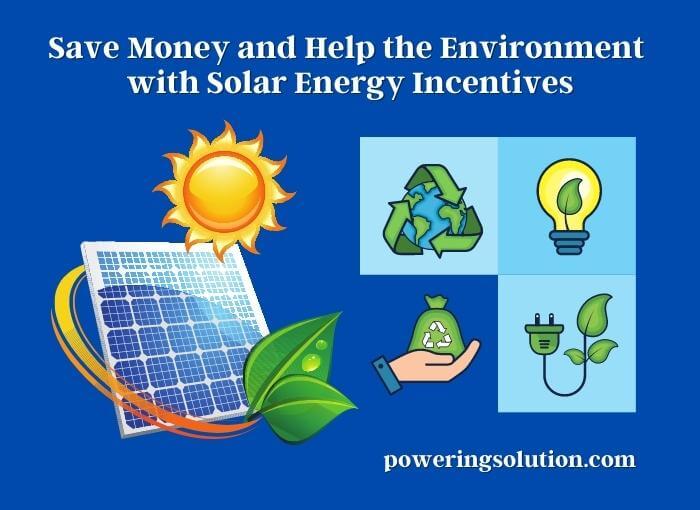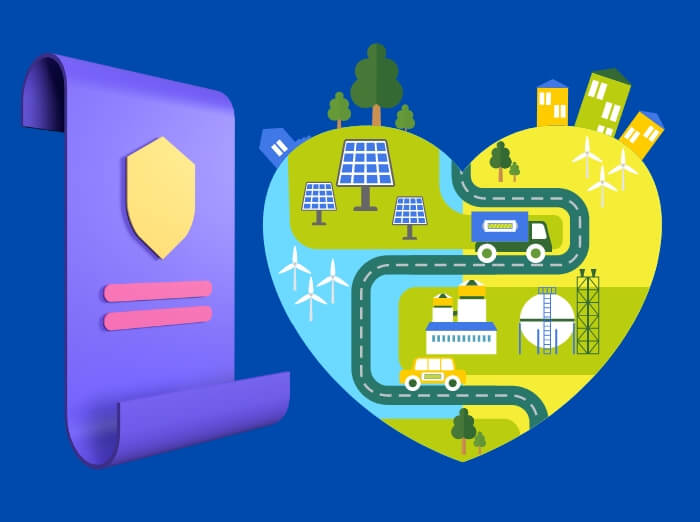Solar energy has become an increasingly popular option for homeowners looking to reduce their carbon footprint and save money on their energy bills. In addition to being a sustainable and renewable source of energy, solar power can also offer financial benefits through various incentives and tax credits.

We will explore the different ways you can save money and help the environment through solar energy incentives, including federal tax credits, state and local incentives, net metering, solar renewable energy certificates, and increased home value. Whether you’re looking to reduce your environmental impact or simply lower your monthly energy bills, solar energy incentives can provide a practical solution. So, let’s dive into the details and discover how you can benefit from solar energy.
Federal Solar Investment Tax Credit
The Federal Solar Investment Tax Credit (ITC) is one of the most significant incentives for homeowners to install solar panels. The ITC allows homeowners to claim a tax credit of up to 26% of the total cost of their solar panel installation, including both equipment and labor. This credit applies to both residential and commercial installations and is available until the end of 2023.
To qualify for the ITC, homeowners must own their solar panel system and have it installed before December 31, 2023. The credit applies to the year the installation was completed, and there is no cap on the total credit amount. Additionally, the credit can be carried over to future tax years if the full amount cannot be claimed in the first year.
It’s worth noting that the tax credit percentage will begin to decrease after 2021. Homeowners who install solar panels in 2022 will be eligible for a credit of 22%, while those who install panels in 2023 will be eligible for a credit of 10%. After 2023, the credit will only be available for commercial solar installations at a rate of 10%.
The ITC can significantly reduce the cost of solar panel installation and make it a more affordable option for homeowners. For example, if a homeowner spends $20,000 on a solar panel system, they could receive a tax credit of up to $5,200 (26% of $20,000), reducing the net cost of the installation to $14,800.
State and Local Incentives
In addition to the Federal Solar Investment Tax Credit, many states and local governments offer incentives to encourage homeowners to switch to solar energy. These incentives can vary widely depending on where you live, but they can include cash rebates, property tax exemptions, and sales tax exemptions.
Cash rebates are a popular incentive offered by many states and utilities. These rebates can range from a few hundred dollars to several thousand dollars, depending on the size and type of solar panel system installed. Some states, such as California and New York, offer generous rebates that can significantly reduce the upfront cost of a solar panel system.
Property tax exemptions are another common incentive offered by states and local governments. These exemptions can reduce or eliminate the property taxes that homeowners pay on their solar panel systems. For example, in Oregon, homeowners with a solar panel system installed are exempt from paying property taxes on the added value of the system for 15 years.
Sales tax exemptions are also available in some states. These exemptions can save homeowners thousands of dollars on the cost of their solar panel system. In Texas, for example, solar panel systems are exempt from the state’s 6.25% sales tax.
It’s important to note that not all states and local governments offer incentives for solar panel installation. Even in areas where incentives are not available, solar panel installation can still provide financial benefits through reduced energy bills and increased home value.
Net Metering
Net metering is a billing arrangement that allows homeowners with solar panels to receive credit for the excess energy they generate and feed back into the electrical grid. Under net metering, homeowners are charged for the net energy they use, which is the difference between the energy they consume from the grid and the energy they generate and feed back into the grid.
Net metering can provide significant financial benefits to homeowners with solar panels. By generating their own energy, homeowners can reduce their monthly energy bills and even earn credits for the excess energy they generate. These credits can then be used to offset future energy bills or carried over to future months.
The specifics of net metering programs vary by state, but most states have some form of net metering in place. Some states require utilities to offer net metering to all customers, while others have caps on the amount of energy that can be net metered. In some states, excess energy generated by solar panels is reimbursed at the retail rate, while in others it is reimbursed at a lower wholesale rate.
It’s important to note that net metering policies can change over time, and some states have recently changed or eliminated their net metering programs. However, even in areas where net metering is not available, homeowners with solar panels can still benefit from reduced energy bills and the ability to generate their own energy.
Solar Renewable Energy Certificates
Solar Renewable Energy Certificates (SRECs) are tradable certificates that represent the environmental benefits of generating electricity from solar energy. Each time a solar panel system generates a certain amount of electricity, it earns one SREC. These SRECs can then be sold to utilities and other companies that need to meet renewable energy mandates or goals.

SRECs can provide a significant source of income for homeowners with solar panel systems. The value of SRECs can vary widely depending on the state and the demand for renewable energy. In some states, such as New Jersey and Massachusetts, the value of SRECs has been high enough to offset a significant portion of the upfront cost of a solar panel system.
The specifics of SREC programs vary by state, but most states that have a renewable energy mandate or goal also have an SREC program in place. In some states, such as New Jersey and Maryland, utilities are required to purchase a certain number of SRECs each year to meet their renewable energy goals. In other states, SRECs are sold on a voluntary market, where companies can purchase them to meet their own sustainability goals.
It’s important to note that not all states have SREC programs in place, and even in states where SRECs are available, the value of SRECs can fluctuate over time. For homeowners with solar panel systems, SRECs can provide a valuable source of income and help offset the upfront cost of a solar panel system.
Increased Home Value
One of the often-overlooked benefits of installing a solar panel system is the potential increase in home value. A study by the Lawrence Berkeley National Laboratory found that homes with solar panel systems sold for an average of $15,000 more than homes without solar panels.
The reason for this increase in home value is multifaceted. Firstly, solar panels can significantly reduce energy bills, which can be a major selling point for homebuyers. Secondly, solar panels are viewed as a valuable asset by many buyers, as they provide a source of clean energy and can potentially earn income through SRECs or net metering.
In addition to the potential increase in home value, solar panel systems can also make a home more attractive to potential buyers. As sustainability becomes an increasingly important issue, more and more homebuyers are looking for homes that have environmentally friendly features. Installing a solar panel system can make a home stand out in the real estate market and attract buyers who value sustainability.
Financing Options for Solar Energy
Even with the available incentives, the cost of a solar panel system can still be a significant investment. Fortunately, there are several financing options available to help make solar more affordable. Some of these options include:
- Solar loans: These are loans specifically designed for solar panel installations. They often have lower interest rates than traditional loans and can be paid back over a period of 10 to 20 years.
- Solar leases: With a solar lease, you lease the solar panel system from a third party and pay a monthly fee. While you won’t own the system, you will still benefit from the energy savings.
- Power Purchase Agreements (PPAs): With a PPA, you purchase the solar energy produced by the system at a set rate. This can be a good option if you don’t want to own the system but still want to benefit from solar energy.
If you want to know the importance of regular maintenance for solar energy systems. Click here to know the answer.
Choosing the Right Solar Energy Incentives for You
With so many solar energy incentives available, it can be challenging to know which ones are right for you. Factors like your location, income level, and energy usage will all play a role in determining which incentives will provide the most significant savings.
To get started, we recommend reaching out to a local solar installer. They can help you determine which incentives are available in your area and provide a cost estimate for installing a solar panel system on your property.
What Factors Affect the Amount of Money I Can Save With Solar Energy Incentives?
Several factors can affect the amount of money you can save with solar energy incentives. These factors include:
Size of your solar panel system: The size of your solar panel system will directly affect how much electricity it can produce. A larger system will generally produce more electricity, which can result in greater savings on your electricity bill.
Location: The amount of sunlight your solar panels receive will depend on your location and the orientation of your home. Homes in sunnier locations or with roofs that face south will generally generate more electricity than those in shadier areas or with less favorable orientation.
Specific incentives available in your area: The incentives available for solar energy can vary depending on where you live. Some states and localities offer more generous incentives than others. It’s important to research the specific incentives available in your area to determine how much money you can save.
Your electricity usage: The electricity you use in your home will also impact how much money you can save with solar energy incentives. If you use a lot of electricity, you may be able to save more money by generating your own electricity with solar panels.
Cost of electricity: The cost of electricity in your area will affect how much you can save with solar energy incentives. If electricity is expensive in your area, you may be able to save more money by generating your own electricity with solar panels.
Final Verdict
Solar energy incentives offer a great opportunity for homeowners to save money while also helping the environment. Federal, state, and local incentives can help offset the cost of installing solar panels, while net metering and solar renewable energy certificates can further increase the financial benefits. Additionally, the increased home value that comes with solar panels can provide long-term financial benefits for homeowners.
When considering whether to invest in solar panels, it’s important to research the specific incentives available in your area and consider factors such as the size of your solar panel system, your location, and your electricity usage.
Solar energy incentives can be a smart and financially beneficial investment for homeowners. As more and more people make the switch to solar energy, technology is becoming increasingly accessible and affordable. If you’re interested in exploring solar energy incentives and making the switch to solar power, now is a great time to start researching your options and taking advantage of these valuable incentives.
